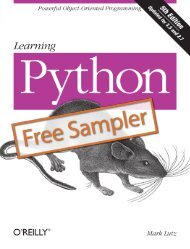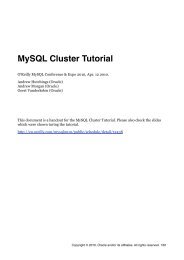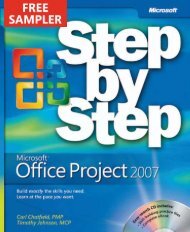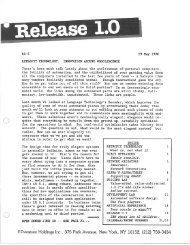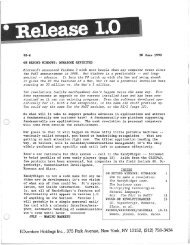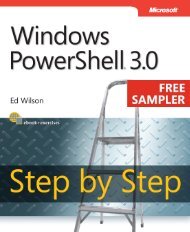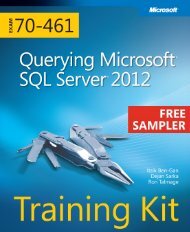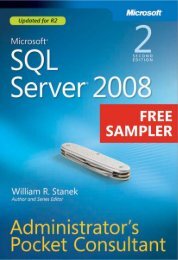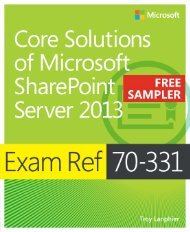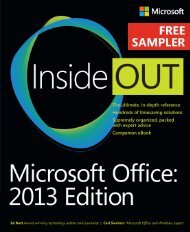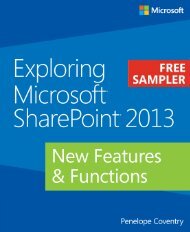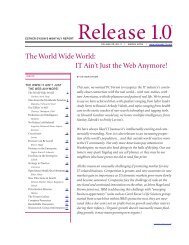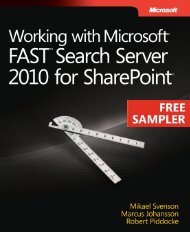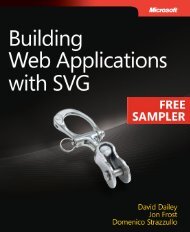Edventure Holdings Inc., 375 Park Avenue, New York, NY 10152 ...
Edventure Holdings Inc., 375 Park Avenue, New York, NY 10152 ...
Edventure Holdings Inc., 375 Park Avenue, New York, NY 10152 ...
Create successful ePaper yourself
Turn your PDF publications into a flip-book with our unique Google optimized e-Paper software.
NITTY-GRITTY EXPERTS: WHAT I SELL IS NOT WHAT YOU SELL<br />
Getting into the "mainstream" is a major concern for AI tool vendors, particularly<br />
as the LISP-machine-based backwaters look less and less inviting.<br />
But there are differing visions of what that means. Is it a question of<br />
hardware environment? Of data access? Of underlying language? Aion, which<br />
offers virtually identical systems written in Pascal and assembler both on<br />
IBM mainframes under MVS and VM/CMS, and on IBM PCs, has never ventured away<br />
from the mainstream; likewise, Distribution Management Systems delivers its<br />
tools and applications on IBM mainframes and DEC VAXen.<br />
IntelliCorp is addressing the problem with KEEconnectiontm , described below,<br />
which enables builder-users of expert systems to establish automatic links<br />
to "mainstream" SQL data bases. Without user intervention, current data can<br />
be gathered and transferred in realtime into a knowledge base for manipulation<br />
by an expert system.<br />
Apex's first product, PlanPower, runs on a LISP machine; its second, to be<br />
announced today (page 13), runs on a VAX linked to PCs -- and its inferencing<br />
engine is written in DEC's LISP.<br />
Now let's consider a third approach, writing expert systems in C. This has<br />
gotten to be a big issue among analysts, who raise it with the tools vendors<br />
every chance they get, but it's actually a decoy for the real issue among<br />
customers: Will it run on machines I'm familiar with? Customers don't mind<br />
LISP as much as they mind LISP machines. With LISPs from Franz, Lucid, Gold<br />
Hill, and others proliferating on Suns, VAXen, and a range of IBM equipment,<br />
it's now becoming possible to stick with LISP even on standard hardware.<br />
The major argument for writing in C or COBOL is not that LISP systems can't<br />
talk to C or COBOL programs or to standard data bases (this is an important<br />
issue but it's not dependent on the use or avoidance of LISP), but that<br />
lower-level languages execute faster. Performance is an issue at runtime -the<br />
issue in transaction applications. For development, speed is something<br />
of an issue, but what C, COBOL and especially assembler programs gain in<br />
speed thay may sacrifice in flexibility, ease of use, and graphical richness.<br />
Just as one size, one operating system, or one kind of hardware does<br />
not fit all, neither does one set of trade-offs in performance.<br />
Transaction systems or realtime systems such as those favored by DMS, Aion,<br />
and Inference are appropriately written in standard high-level languages or<br />
assembly language. But for interactive systems where the application itself<br />
is in a sense development -- decision support (the archetypical "expert<br />
system"), generating queries in response to a user's curiosity, software<br />
design, or expert systems in general rather than standard applications with<br />
embedded expert systems -- LISP continues to make sense.<br />
One man's meat, another man's poison<br />
At our instigation, and at management's invitation, Distribution Management<br />
Systems chairman John Landry attended IntelliCorp's announcement of KEEconnectiontm<br />
. Rather than quake in his boots or call up his development<br />
people to start a new project, Landry cheerfully noted that KEEconnection<br />
proliferates redundant data without regard for integrity and, because it<br />
stores data temporarily in its knowledge base during a consultation, doesn't<br />
deal with realtime data. Of course, that's not what it is designed to do.<br />
Release 1.0 26 January 1987<br />
8



